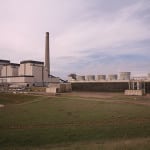In a decision blasted by the coal industry as making the state "dangerously reliant" on natural gas, the Colorado Public Utilities Commission has approved an emissions-reduction plan for Xcel Energy that further expands the utility’s already extensive shutdown of coal-fired power plants in favor of gas-fueled generation.
The plan, approved on a 3-0 vote December 15, largely follows Xcel’s "preferred plan" for complying with the state’s new Clean Air-Clean Jobs Act, which was backed by Xcel and signed into law in April by Colorado Gov. Bill Ritter (D).
The law requires Colorado’s investor-owned utilities—Xcel and Denver-based Black Hills Energy—to reduce emissions of nitrogen oxides (NOx) from their power plants located along the Rocky Mountain Front Range by 70% to 80% by 2017 to help the state meet federal regional haze limits.
To achieve that goal, the law calls for Xcel to retire or retrofit 900 MW of its in-state coal-fired capacity and replace it with natural gas or renewable energy resources.
In largely embracing the plan put forward by Xcel—the state’s largest utility—the PUC approved a program that is expected to cost $1.4 billion and raise electric rates for its customers by 2.5% through 2020.
However, the PUC quashed a component of Xcel’s preferred plan to add selective non-catalytic conversion NOx controls at one of its four units at its Cherokee coal-fired power plant in Denver, and instead ordered Xcel to switch the unit to gas by the end of 2017.
Xcel planned to outfit the unit, Cherokee 4, with NOx controls in 2012 and run the plant with retrofits until its retirement in 2022. Xcel said retrofitting Cherokee 4 could be done quickly and cheaply and still lower the coal plant’s NOx emissions by at least 30%.
However, the PUC said such a move would provide little benefit and come too late to achieve the law’s emissions goals. Nonetheless, the panel said in a statement it will explore "other possible options" for Cherokee 4 in Xcel’s 2011 electric resource plan.
In a statement, Xcel said it "generally supported" the PUC’s decision, but indicated it will seek "clarification" on certain of the plan’s points.
"We have reviewed the commission’s decision, and although the approved plan does not include everything we recommended, we do believe it meets the intent of the legislation and will achieve a cleaner energy future at a reasonable cost to customers," said Xcel.
"While we generally support this decision and believe it provides a workable plan, we will need to return to the commission for clarification and reconsideration on some details associated with timing and cost recovery."
The PUC’s plan for Xcel is notable in that achieves most of the needed emissions reductions by closing down coal-fired units and replacing them with gas-fueled plants.
Under the plan, Xcel Energy will retire 550 MW of coal generation by closing three units at its Cherokee plant, an aging 45-MW unit at its Arapahoe plant in Denver and its 186-MW Valmont plant in Boulder by the end of 2017. The Cherokee units will be replaced with a 569-MW natural gas combined-cycle plant in 2015.
The PUC also approved converting a 111-MW coal-fired unit at Arapahoe to natural gas generation by the end of 2013, as well as the 352-MW Cherokee 4 coal-to-gas switch.
The company will maintain some coal generation by installing new emission controls. It will install selective catalytic reduction (SCR) and a sulfur dioxide scrubber at the 505-MW Pawnee Unit 1 coal plant in 2014. It also will install SCR at the 184-MW Hayden 1 in 2015 and at the 262-MW Hayden 2 plant in 2016.
For Black Hills, the PUC approved retiring the company’s two coal generation units in Cañon City and replacing them with a new gas-fired unit in Pueblo—a move the PUC said could raise electric rates for that utility’s customers by as much as 5%.
The commission’s decision comes as many U.S. utilities are switching from coal to cleaner-burning gas to meet increasingly stringent clean air requirements. However, passage of Colorado’s Clean Air-Clean Jobs Act marked perhaps the most aggressive and high-profile effort by any state to adopt a "dash-to-gas" approach to reduce emissions.
America’s Natural Gas Alliance, a gas producer group that has been pushing hard for expanded gas use by utilities, applauded the PUC’s decision in a recent statement and predicted it would prompt other states to consider increased gas use in electric generation.
However, the PUC decision was decried by a coalition of coal groups led by former Colorado PUC commissioners Polly Page and Carl Miller, who said the state’s utilities would become overly dependent on gas.
"In addition to significantly raising electric rates on consumers, this plan will introduce substantial reliability and efficiency risks to our electric system," said Affordable and Reliable Energy Colorado in a December statement.
"The plan is dangerously reliant on natural gas. Given the limited gas storage on the Front Range, any disruption to gas supply could force rolling blackouts…."
The group also expressed concern shared by many utility officials that fuel switching may lead to over-dependence on gas, which has seen volatile price swings in the past.
"The cost of natural gas to produce electricity in Colorado rose more than 175% between 2002 and 2008," the group said, citing recent Energy Department statistics.
The group last year called for the ouster of PUC Chairman Ron Binz and Commissioner Matt Baker over their participation in helping draft the Colorado law.
However, Xcel spokesman Mark Stutz said the utility had no such objections.
"The coal industry clearly sees this case as a major battle in their attempt to derail the coal-to-gas switching process," said Stutz in a recent statement.
"There has been nothing unusual in our minds about this process other than it went by very fast. Chairman Binz is expected to be an advisor on legislation in certain cases."
Binz is active on national issues as head of the climate task force of the National Association of Regulatory Utility Commissioners (NARUC). Baker is the co-vice chair of NARUC’s gas committee.
—Johnathan Rickman (jrickman@accessintel.com) is a reporter for The Energy Daily (www.theenergydaily.com), where this article first appeared.








